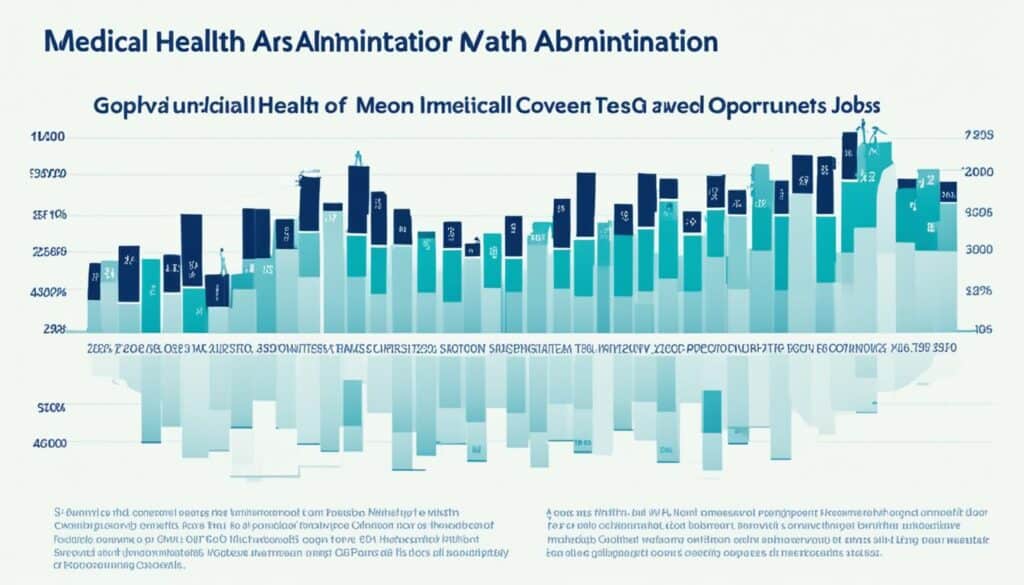Medical Health Administration is a multidisciplinary field that combines aspects of business, health policy, and science to improve the quality and efficiency of healthcare services. Professionals in this field work in various healthcare settings, such as hospitals, nursing homes, clinics, and public health departments. Their responsibilities include operational management, financial management, human resources management, strategic planning, and policy development.
To become a medical health administrator, individuals typically need a bachelor’s degree in healthcare administration or a related field, and many pursue advanced degrees like a Master of Health Administration (MHA). Practical experience through internships, entry-level healthcare careers, and volunteer opportunities can also be valuable. Medical health administrators must possess a range of hard skills, such as understanding healthcare finance and compliance, as well as soft skills like communication and problem-solving.
This career path offers diverse opportunities in hospitals, nursing homes, outpatient care centers, and public health organizations, with a projected faster-than-average job growth rate and competitive salaries. Additionally, medical health administrators must navigate healthcare laws and ethics, such as HIPAA compliance and ethical considerations, as well as utilize benchmarking and performance measurement to drive continuous improvement.
Key Takeaways
- Medical Health Administration combines business, health policy, and science to improve healthcare services.
- Professionals in this field work in various healthcare settings, with responsibilities in operations, finance, HR, strategy, and policy.
- A bachelor’s degree in healthcare administration or a related field is typically required, and many pursue advanced degrees like an MHA.
- Medical health administrators must possess a range of hard and soft skills, including healthcare finance, compliance, communication, and problem-solving.
- This career path offers diverse opportunities with a projected faster-than-average job growth rate and competitive salaries.
What is Medical Health Administration?
Medical Health Administration is a multidisciplinary field that combines aspects of business, health policy, and science to improve the quality and efficiency of healthcare services. It is integral to healthcare governance and involves leading and managing healthcare systems.
Definition of Medical Health Administration
Medical Health Administration is the strategic and operational management of healthcare organizations, including hospitals, clinics, nursing homes, and public health departments. Professionals in this field are responsible for ensuring the efficient and effective delivery of healthcare services to patients and communities.
Scope of Medical Health Administration
The scope of Medical Health Administration encompasses a wide range of responsibilities, such as financial management, human resources management, strategic planning, policy development, and regulatory compliance. Medical health administrators work closely with healthcare professionals and healthcare organizations to optimize the performance and quality of healthcare services.
Importance of Medical Health Administration
Medical Health Administration plays a crucial role in the healthcare industry, as it ensures the efficient and effective delivery of healthcare services to patients and communities. By applying business principles, data-driven decision-making, and evidence-based practices, medical health administrators help healthcare organizations improve patient outcomes, reduce costs, and enhance the overall healthcare quality.
Roles and Responsibilities of a Medical Health Administrator

As the backbone of healthcare systems, medical health administrators , also known as healthcare administrators or health services managers , play a crucial role in ensuring the efficient and effective delivery of patient care. Their responsibilities span a wide range of crucial areas, including operational management, financial management, human resources management, strategic planning, and policy development and compliance.
Operational Management
Medical health administrators are responsible for overseeing the day-to-day operations of healthcare facilities, ensuring smooth coordination between various departments and teams. This includes managing resource management, budget management, staffing, recruiting, and performance evaluation. They work closely with healthcare professionals to optimize patient care and improve the overall healthcare environment.
Financial Management
Effective financial management is a critical component of the medical health administrator’s role. They are tasked with overseeing the budget, resource allocation, and financial reporting for their healthcare organization. This involves analyzing financial data, identifying cost-saving opportunities, and ensuring compliance with federal regulations and organizational goals.
Human Resources Management
Medical health administrators play a pivotal role in managing the human resources of their healthcare organization. This includes staffing, recruiting, performance evaluation, and training of healthcare professionals. They ensure that their organization has the right personnel in place to deliver high-quality patient care while maintaining compliance and quality assurance standards.
Strategic Planning
Medical health administrators are responsible for developing and implementing strategic plans to guide the long-term growth and success of their healthcare organization. This involves setting organizational goals, identifying market trends, and aligning the organization’s resources and capabilities to meet the evolving needs of the healthcare environment.
Policy Development and Compliance
As healthcare organizations navigate an increasingly complex regulatory landscape, medical health administrators play a crucial role in policy development and regulatory compliance. They ensure that their organization adheres to all relevant federal regulations, industry standards, and ethical considerations, while also advocating for policies that support the delivery of high-quality patient care.
Educational Requirements for Medical Health Administration

To qualify for a position as a medical health administrator, individuals typically need to earn a bachelor’s degree, often in healthcare or business management. Common degree programs include a Bachelor of Science in Health Management or a related healthcare administration degree.
For those seeking to advance their careers in medical health administration, obtaining a master’s degree in health administration (MHA) can be highly beneficial. An MHA program provides in-depth knowledge and training in areas such as healthcare administration curriculum, healthcare administration coursework, and the development of critical healthcare administration skills.
Whether pursuing a bachelor’s or master’s degree, students in healthcare administration programs can expect to gain a comprehensive understanding of the healthcare industry, including topics like healthcare management, healthcare policy, healthcare finance, and healthcare information systems. This foundational knowledge equips aspiring medical health administrators with the necessary healthcare administration skills to succeed in a variety of healthcare administration careers and healthcare administration jobs.
It’s important to note that many healthcare administration programs are accredited by organizations like the Commission on Accreditation of Healthcare Management Education (CAHME), ensuring the quality and rigor of the healthcare administration curriculum. Additionally, some healthcare administration careers may require specific healthcare administration licensing or healthcare administration certification.
Gaining Practical Experience

To become a successful medical health administrator, aspiring professionals often need to gain practical experience in a healthcare setting. This can be achieved through a variety of avenues, including internships, entry-level healthcare careers, and volunteer opportunities.
Internships in Healthcare Settings
Completing an internship in a healthcare organization is a valuable way for individuals to obtain hands-on experience and learn the inner workings of the healthcare administration field. These internships can provide exposure to clinical and non-clinical aspects of healthcare administration, as well as opportunities to develop essential skills and build professional networks.
Entry-Level Healthcare Careers
In addition to internships, entry-level healthcare careers can also offer practical experience and on-the-job training for aspiring medical health administrators. These entry-level positions may include roles in healthcare operations, patient services, or administrative support, allowing individuals to gain industry experience and build a foundation for a career in healthcare administration.
Volunteer Opportunities
Engaging in volunteer opportunities within the healthcare industry can also be a valuable way for individuals to develop their professional skills and contribute to the community. These experiences can provide exposure to different healthcare settings, enhance communication and problem-solving abilities, and demonstrate a commitment to the healthcare field.
By combining educational experiences with practical, hands-on opportunities, aspiring medical health administrators can build a well-rounded portfolio of healthcare administration experience that can support their career development and professional growth in this dynamic and rewarding field.
Medical Health Administration Certifications and Licensure

While most medical health administrators do not require professional certification to begin their careers, various certification programs can be valuable for deepening their healthcare management-related skills. These certifications can enhance an administrator’s credibility, demonstrate their expertise, and open up new healthcare management opportunities.
Some of the popular healthcare management certifications include the Certified Healthcare Administrative Professional (CHAP), Certified Healthcare Compliance (CHC) credential, and Certified in Healthcare Privacy and Security (CHPS) designation. Administrators who work in nursing homes may also need to obtain a nursing home administrator license, while those in social work may require a social worker license. Additionally, registered nurses transitioning into healthcare management roles may need to maintain their nursing license.
Beyond certifications, healthcare management professionals can also enhance their credentials through various professional development and continuing education opportunities. These may include attending industry conferences, participating in webinars, or completing online courses in areas such as healthcare compliance, healthcare finance, and healthcare information systems.
| Certification | Description | Typical Eligibility Requirements |
|---|---|---|
| Certified Healthcare Administrative Professional (CHAP) | Demonstrates expertise in healthcare administrative and managerial functions | Bachelor’s degree, 2+ years of healthcare administration experience |
| Certified Healthcare Compliance (CHC) | Validates knowledge of healthcare compliance regulations and best practices | Bachelor’s degree, 2+ years of healthcare compliance experience |
| Certified in Healthcare Privacy and Security (CHPS) | Recognizes proficiency in healthcare privacy and security management | Bachelor’s degree, 2+ years of healthcare privacy and security experience |
| Nursing Home Administrator License | Required for administrators managing nursing home facilities | Varies by state, typically includes education and examination requirements |
| Social Worker License | Necessary for administrators overseeing social services within healthcare settings | Varies by state, often requires a master’s degree in social work |
| Registered Nurse (RN) License | Maintained by nurses transitioning into healthcare management roles | Nursing degree, passing the NCLEX-RN exam, and state-specific requirements |
By pursuing relevant healthcare management certifications and maintaining necessary licenses, medical health administrators can demonstrate their commitment to professional development and enhance their ability to lead and manage healthcare organizations effectively.
Skills Needed for Medical Health Administration

To excel in the field of medical health administration, professionals must possess a diverse array of skills, both technical and interpersonal. These skills are essential for effectively managing healthcare operations, optimizing organizational efficiency, and delivering high-quality patient care.
Hard Skills
Medical health administrators must have a strong grasp of technical healthcare compliance skills, ensuring their organizations adhere to all relevant laws, regulations, and industry standards. This includes a thorough understanding of healthcare finance skills, such as budgeting, financial reporting, and reimbursement mechanisms. Additionally, healthcare information systems skills are crucial, as administrators must be able to leverage technology to streamline processes, analyze data, and make informed decisions.
Other key hard skills for medical health administrators include healthcare regulations skills, which involve staying up-to-date with evolving healthcare policies and guidelines, as well as data analysis skills to interpret and utilize performance metrics for continuous improvement.
Soft Skills
Alongside technical expertise, medical health administrators must also possess a robust set of soft skills to effectively lead their teams and navigate the complex healthcare landscape. Strong communication skills are essential for collaborating with various stakeholders, including healthcare professionals, patients, and regulatory bodies.
Additionally, problem-solving skills and critical thinking are vital for identifying and addressing operational challenges, while leadership skills enable administrators to inspire their teams and drive organizational change. Adaptability and strategic thinking are also highly valued, as medical health administrators must be able to navigate the constantly evolving healthcare environment.
By combining a deep understanding of medical health administration skills with a versatile skill set, healthcare leaders can effectively manage the complexities of the industry, optimize organizational performance, and deliver exceptional patient outcomes.
Career Progression and Opportunities

Medical health administrators can find a wide range of career opportunities in various healthcare settings, allowing them to advance their medical health administration career and healthcare management career. These settings include hospitals and health systems, nursing homes and assisted living facilities, outpatient care centers, and public health organizations.
Hospitals and Health Systems
Large hospitals and integrated health systems offer numerous healthcare administration job opportunities for medical health administrators. These roles may include overseeing hospital operations, managing departmental budgets, leading strategic planning initiatives, and ensuring regulatory compliance. Medical health administrators in hospitals and health systems often work in healthcare leadership roles and healthcare executive roles.
Nursing Homes and Assisted Living Facilities
Medical health administrators are in high demand at nursing homes, assisted living facilities, and other long-term care settings. In these roles, they may be responsible for overseeing daily operations, managing staff, ensuring regulatory compliance, and implementing quality improvement initiatives. Nursing home administrators and assisted living facility managers are often medical health administrators with specialized expertise.
Outpatient Care Centers
Outpatient care centers, such as clinics, ambulatory surgery centers, and diagnostic imaging facilities, also present healthcare administration job opportunities for medical health administrators. In these settings, administrators may focus on improving patient experiences, optimizing workflows, and ensuring the efficient delivery of outpatient services.
Public Health Organizations
Medical health administrators can also find career opportunities in public health organizations, such as government agencies, non-profit entities, and community-based programs. In these roles, they may contribute to public health policy development, manage community health initiatives, and collaborate with healthcare providers to improve population-level health outcomes.
Regardless of the specific healthcare setting, medical health administrators play a crucial role in advancing their careers and contributing to the overall healthcare administration job market and outlook.
Medical Health Administration Salary and Job Outlook

One of the key considerations for individuals pursuing a career in medical health administration is the potential salary and job outlook. According to the Bureau of Labor Statistics, the average salary for medical and health services managers, which includes healthcare administrators, is $101,340 per year in the United States. This figure reflects the value that healthcare organizations place on skilled professionals who can effectively manage operations, finances, human resources, and strategic planning within the rapidly evolving healthcare industry.
Average Salary
The average salary for healthcare administrators can vary depending on factors such as geographic location, level of education, years of experience, and the specific healthcare setting. Top earners in the field can command salaries well above the national average, particularly those in leadership roles within large hospital systems or prestigious healthcare organizations. Additionally, obtaining advanced certifications or a master’s degree in healthcare administration (MHA) can further increase an individual’s earning potential.
Job Growth Projections
The job outlook for medical health administrators is exceptionally promising, with the Bureau of Labor Statistics projecting a much faster-than-average growth rate of 32% between 2022 and 2032. This rapid expansion is driven by the increasing demand for skilled healthcare managers to oversee the operations of an aging population’s growing healthcare needs. As the healthcare industry continues to evolve, with a greater emphasis on cost-effective, high-quality care, the need for knowledgeable and experienced medical health administrators will only continue to grow.
| Metric | Statistic |
|---|---|
| Average Salary for Medical Health Administrators | $101,340 per year |
| Job Growth Projection (2022–2032) | 32% (much faster than average) |
| Job Outlook | Excellent, driven by aging population and evolving healthcare industry |
Understanding Healthcare Laws and Ethics

As medical health administrators navigate the complex landscape of healthcare, they must have a deep understanding of the laws, regulations, and ethical considerations that govern the industry. Maintaining compliance with these standards is crucial for ensuring patient privacy, quality care, and the overall success of healthcare organizations.
HIPAA and Patient Privacy
The Health Insurance Portability and Accountability Act (HIPAA) is a critical piece of legislation that medical health administrators must thoroughly comprehend. HIPAA establishes strict guidelines for the protection of patient healthcare laws and patient privacy, requiring healthcare organizations to implement robust security measures to safeguard sensitive information. Failure to comply with HIPAA regulations can result in significant healthcare regulations and regulatory compliance penalties, making it a top priority for medical health administrators.
Regulatory Compliance
Beyond HIPAA, medical health administrators must stay up-to-date with a wide range of healthcare laws and healthcare regulations that impact their organizations. This includes compliance with medical health administration compliance standards, healthcare administration regulations, healthcare administration policies, and healthcare administration standards. By ensuring their organizations adhere to these regulatory requirements, medical health administrators can mitigate risks, protect patient safety, and maintain the trust of healthcare ethical considerations in healthcare.
Ethical Considerations
In addition to legal and regulatory compliance, medical health administrators must also navigate the complex realm of healthcare ethics. This includes making decisions that balance the needs of patients, healthcare providers, and the organization as a whole. Ethical considerations in healthcare may involve issues such as healthcare administration ethics, healthcare administration best practices, and healthcare administration risk management. By upholding the highest ethical standards, medical health administrators can foster a culture of trust, transparency, and quality care within their organizations.
Benchmarking and Performance Measurement

Effective medical health administration involves the use of healthcare benchmarking and healthcare performance measurement to drive healthcare continuous improvement within healthcare organizations. By establishing key performance indicators (KPIs) for critical areas such as quality, efficiency, and patient satisfaction, medical health administrators can gain valuable insights into their organization’s performance and identify opportunities for enhancement.
Key Performance Indicators (KPIs)
KPIs for medical health administration may include metrics related to medical health administration data-driven decision making, medical health administration quality assurance, medical health administration process improvement, medical health administration efficiency, and medical health administration effectiveness. These indicators help medical health administrators track and monitor the organization’s progress toward its strategic goals and objectives.
Data Analysis and Reporting
Leveraging data analysis in healthcare, medical health administrators can compile comprehensive healthcare reporting that provides a clear, data-driven understanding of the organization’s performance. This information is vital for making informed decisions, allocating resources effectively, and identifying areas for medical health administration analytics and continuous improvement.
Continuous Improvement
By regularly reviewing KPIs and analyzing performance data, medical health administrators can implement targeted initiatives to enhance medical health administration efficiency and medical health administration effectiveness. This healthcare continuous improvement approach helps healthcare organizations stay agile, responsive, and dedicated to providing the highest quality care to patients.
| Key Performance Indicator | Description | Benchmark |
|---|---|---|
| Patient Satisfaction | Measures patient experience and satisfaction with the care received | 90% patient satisfaction rate |
| Medication Error Rate | Tracks the number of medication errors per 1,000 patient days | Less than 1 error per 1,000 patient days |
| Hospital Readmission Rate | Monitors the percentage of patients readmitted within 30 days of discharge | Less than 15% readmission rate |
| Operating Margin | Measures the organization’s financial efficiency and profitability | Minimum 3% operating margin |
Also Read: Health Wellness: Unlock Your Potential For A Vibrant Life
Conclusion
In summary, medical health administration is a crucial field that combines business, health policy, and science to enhance the quality and efficiency of healthcare services. Healthcare administrators play a vital role in overseeing various aspects of healthcare operations, including financial management, human resources, strategic planning, and policy development. To succeed in this dynamic field, individuals typically pursue a bachelor’s or master’s degree in healthcare administration, supplemented by practical experience through internships, entry-level roles, and volunteer opportunities.
The healthcare administration career path offers a diverse range of opportunities, from hospitals and nursing homes to outpatient care centers and public health organizations. These professionals are responsible for ensuring regulatory compliance, promoting ethical practices, and driving continuous improvement through data-driven decision-making. With a projected faster-than-average job growth and competitive salaries, a career in medical health administration presents exciting leadership opportunities for those passionate about enhancing the overall healthcare system.
As the healthcare industry continues to evolve, the importance of medical health administration cannot be overstated. These dedicated professionals work tirelessly to improve the value proposition, impact, and future of healthcare, making a tangible difference in the lives of patients and their communities. By leveraging their expertise in business, policy, and science, healthcare administrators are poised to lead the way in transforming the healthcare landscape and ensuring the highest standards of care.
FAQs
Q: What is healthcare administration?
A: Healthcare administration involves the management and coordination of healthcare services and facilities to ensure efficient operations.
Q: How can I become a healthcare administrator?
A: To become a healthcare administrator, you typically need a bachelor’s or master’s degree in healthcare administration or a related field.
Q: What are the career opportunities in healthcare administration?
A: Healthcare administrators can work in hospitals, clinics, nursing homes, and other healthcare settings overseeing day-to-day operations.
Q: What is the salary range for healthcare administrators?
A: The median annual salary for healthcare administrators is around $100,000, but can vary based on experience, location, and specific role.
Q: What skills are essential for a successful career in healthcare administration?
A: Successful healthcare administrators need strong leadership, communication, analytical, and problem-solving skills, along with a deep understanding of healthcare systems.
Q: Why is there a high demand for healthcare administrators?
A: The demand for healthcare administrators is increasing due to the growing healthcare industry, advancements in medical technology, and the need for efficient management of healthcare services.
Q: Can I pursue an online healthcare administration degree?
A: Yes, there are many accredited online programs that offer degrees in healthcare administration, providing flexibility for working professionals or those unable to attend traditional classes.
Source Links
- https://www.phoenix.edu/blog/how-to-become-a-health-services-manager.html
- https://www.mgma.com/books/benchmarking-success-the-essential-guide-for-medical-practice-managers-2nd-edition
- https://www.coursera.org/articles/healthcare-administration




